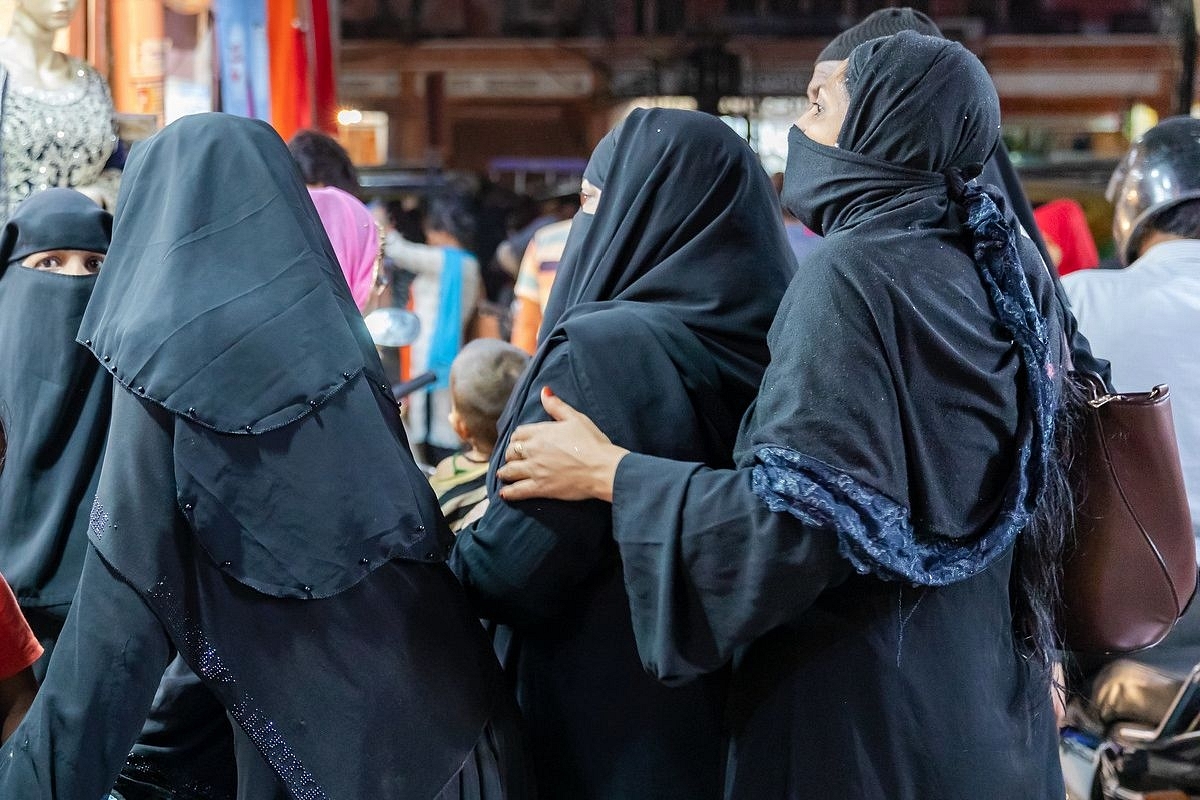Politics
‘One Of The Most Hideous Sights One Can Witness In India’. What Ambedkar Said About Women In Islamic Veil
- BR Ambedkar in his 1945 book ‘Pakistan or the Partition of India’ wrote:
- The evil consequences of purdah are not confined to the Muslim community only. It is responsible for the social segregation of Hindus from Muslims which is the bane of public life in India.
- But the Hindus are right when they say that it is not possible to establish social contact between Hindus and Muslims because such contact can only mean contact between women from one side and men from the other.

(Flickr)
For a month now, young women in some pre-university colleges (Class11-12) in Karnataka have been protesting against administration rules prohibiting them from wearing veils to the campus.
The protests began in December when eight girls in an all-women pre-university college began to sport hijab and were denied entry into the campus by the administration. The girls defended their act by arguing that they had only recently discovered that the institute had no stated rule against hijab. They said they wanted to wear hijab as the institute has male teachers.
The protest soon spread to other colleges in the state. As per reports, at least five educational institutes in Karnataka are demonstrating pro-hijab protests now.
Protesters are calling the hijab (veil that covers the head and neck but allows sight of the face) and burqa (full-body veil barring the eyes) symbols of their Islamic faith. They say they are protesting for their right to wear the veil for, to them, it means a right to practice their religion.
At least one college has arranged for a separate room for women to keep their veils and attend classes in normal clothes, but students insist they wish to wear it at all times.
In a country that has been witnessing Hindu-Muslim conflict for centuries, which has not ceased to exist despite a bloodied partition in 1947 on religious lines, the controversy in Karnataka has triggered yet another confrontation between Hindus and Muslims.
Hindu students at these colleges – both men and women - have begun to sport saffron stoles as a mark of protest against any concession given solely to Muslim students. This competitive religiosity on campus has prompted college administrations to say that no overt display for religion would be tolerated at the campus.
The ongoing conflict could well be a case study in BR Ambedkar’s 1945 book ‘Pakistan or the Partition of India’, where he advocated the creation of Pakistan and a total transfer of Muslim population to Pakistan.
Citing several communal clashes and confrontations between the Hindu and Muslim communities, Ambedkar argued that an India with no solution to the Hindu-Muslim problem will lead to social stagnation. He wrote:
Ambedkar said that this “menace” is sure to last “as long as the Hindus and Muslims are required to live as members of one country under the mantle of a single constitution”.
Indeed, it is the conservative section of the Muslim society backing and fuelling the pro-burqa demands.
The Campus Front of India, a student group that traces its roots to the militant Students Islamic Movement of India (SIMI), is at the forefront of leading the protests even as progressive Muslim voices on social media are decrying the protests, calling the veil a “medieval symbol of backwardness, disempowerment and patriarchy”.
It is interesting here, to recall Ambedkar’s take on the veil.
While radical Islamic groups including the Campus Front of India often attempt to club the struggles of the Hindu Dalit community in their religious mission, in the pretext of forming a common front against “saffronisation”, the Dalit icon called burqa-donning women “one of the most hideous sights one can witness in India”.
This is what he Ambedkar wrote (Pakistan or the Partition of India):
On social evils, where Ambedkar questioned the propaganda that Muslims in India were a progressive people compared to Hindus
On purdah or veil among Muslim women
On the religious sanction to the veil in Islam compared to Hindu religions
More than 75 years later, these writings by Ambedkar are as relevant as they were when they were originally written in the run-up to the partition.
The ongoing movement in support of the veil is an Islamic movement that is only exposing the centuries-old fissures between the Hindu and Muslim communities in India.
To the women and other marginalised sections, a conservative movement such as this does no good. As Ambedkar had warned, it’s a manifestation of social stagnation.
Support Swarajya's 50 Ground Reports Project & Sponsor A Story
Every general election Swarajya does a 50 ground reports project.
Aimed only at serious readers and those who appreciate the nuances of political undercurrents, the project provides a sense of India's electoral landscape. As you know, these reports are produced after considerable investment of travel, time and effort on the ground.
This time too we've kicked off the project in style and have covered over 30 constituencies already. If you're someone who appreciates such work and have enjoyed our coverage please consider sponsoring a ground report for just Rs 2999 to Rs 19,999 - it goes a long way in helping us produce more quality reportage.
You can also back this project by becoming a subscriber for as little as Rs 999 - so do click on this links and choose a plan that suits you and back us.
Click below to contribute.
Latest